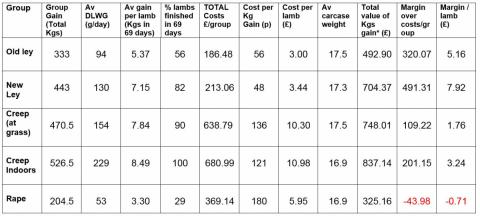Choosing whether or not to finish lambs rather than sell stores and then deciding on a practical, cost-effective lamb finishing system is an important decision that can have a significant impact on the profitability of a sheep enterprise.
It can be difficult to find a system that strikes the right balance between cost and good daily liveweight gains (DLWG) and finishing rates. Farmers also have to consider the potential impact on grazing for ewes running up to and during tupping which could impact next year’s lamb crop. At Aberbranddu, near Pumsaint, Carmarthenshire - a Farming Connect Demonstration Site – Irwel Jones undertook a project this autumn which evaluated the output and profitability of five different lamb finishing systems.
“We wanted to try to finish lambs earlier on less ground, so we decided on five different options, and as well as how well they finished we wanted to look at the most cost-effective option because that’s the bottom line at the end of the day,” said Irwel, who farms the 850-acre upland farm with his parents and usually finishes 800 lambs on reseeds and silage aftermath between September and the end of November.
For the project, five groups of 62 lambs, which all averaged 32kg, were finished on:
- Forage rape and Italian Ryegrass mix (2 acres)
- New reseed (8 acres)
- Old ley only (14 acres)
- Old ley with concentrate supplements (10 acres)
- Concentrates indoors
On the first days of the project in September, 41 lambs were sold as stores at the local mart and averaged £53, which provided a useful benchmark when evaluating the profitability of the five finishing systems. As expected, the lambs kept indoors and fed creep had the biggest daily liveweight gains and were faster to finish, with a 100% finish rate by the end of the project in November.
However, in terms of margin per lamb, the lambs grazing the new ley outperformed the other groups, with a margin of £7.92per lamb, compared to £5.16 on the old ley, £3.24 for the indoor group and £1.76 for the old ley with creep.
“With the lambs fed the concentrates, yes we got the performance, yes we got them finished, but they didn’t have the highest margin. The new ley is streaking ahead in terms of the margin,” said independent sheep consultant Lesley Stubbings at a Farming Connect open day at Aberbranddu. “However, you’ve got to weigh that up against other factors such as whether by grazing the lambs you pinch grazing from the ewes.”
Unfortunately, the forage rape crop significantly underperformed, due to varying factors, including late sowing and a high seed rate, which resulted in a very dense crop that was low in protein.
“Also, I may have tried to utilise the crop too quickly and get too much out of it, without giving the lambs time to adjust. I’m blaming myself for the fact the rape didn’t come out too well and I will be trying a bigger plot next year to see if I can get it right,” said Irwel.
Lesley Stubbings acknowledged that the project “had not given a fair trial of forage rape to fatten lambs” and Francis Dunne, of Field Options Performance Seeds, highlighted rape as one of the key fodder crops used for finishing lambs. Fodder beet, swedes, kale and stubble turnips were the other crops discussed by Mr Dunne, who outlined the key considerations when planting forage crops.
“You need to know what date will the field be available for sowing, when is crop going to be utilised and what performance is required - is it for lambs or ewes? It’s important to plant the right thing at the right time to get the best results,” he said.
Lesley also discussed ewe nutrition, highlighting three key points – the importance of maintaining body condition score throughout the year; having silage analysed to maximise forage and keep the use and cost of supplements to a minimum; and maintaining the amount of forage fed in late pregnancy for rumen health.

